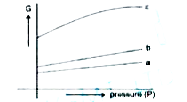For a perfectly crystalline solid Cp.m=aT3, where a is constant. If Cp.m is 0.42 J/K − mol at 10K, molar entropy at 10K isSolution in Telugu
0.42 J/K-mol
0.14 J/K-mol
4.2 J/K-mol
zero
The correct Answer is:B
Step by step video, text & image solution for For a perfectly crystalline solid C_(p.m) = aT^(3), where a is constant. If C_(p.m) is 0.42 J/K - mol at 10K, molar entropy at 10K is by Chemistry experts to help you in doubts & scoring excellent marks in Class 12 exams.
Updated on:21/07/2023Topper's Solved these Questions
- CHEMICAL THERMODYNAMICSBOOK - AAKASH SERIESCHAPTER - CHEMICAL THERMODYNAMICSEXERCISE - Additional Practice Exercise
54 Videos
- CHEMICAL THERMODYNAMICSBOOK - AAKASH SERIESCHAPTER - CHEMICAL THERMODYNAMICSEXERCISE - Practice Sheet- Exercise-III
30 Videos
- CHEMICAL KINETICSBOOK - AAKASH SERIESCHAPTER - CHEMICAL KINETICSEXERCISE - Objective Exercise - 4 (Assertion (A) & Reason (R) Type Questions)
44 Videos
- CHEMISTRY IN EVERY DAY LIFEBOOK - AAKASH SERIESCHAPTER - CHEMISTRY IN EVERY DAY LIFEEXERCISE - PRACTICE EXERCISE
29 Videos
Similar Questions
Which among the following is not an exact differential?
View SolutionThe following curve represents the variation of Gibbs function 'G' with pressure at constant temperature. Correct match of given plots with the physical state of a substance is

View Solution(A) Spontaneous reaction may be slow or fast.
(R ) Spontaneous nature deals with feasibility of the reaction but not rate.
View SolutionAnti allergy drugs are
View SolutionFor a perfectly crystalline solid Cp.m.=aT3, where ais constant. If Cp.m. is 0.42.J//K-"mol" at 10K, molar entropy at 10K is:
View SolutionFor a perfectly crystalline solid Cp.m.=aT3+bT,where a and b constant . If Cp.m.is0.40J/Kmol at 10K and 0.92J/Kmolat20K then molar entropy at 20k is:
View SolutionFor a perfectly crystalline solid C_(p,m)=aT^(3)+bT , where a and b are constant. If C_(p,m) is 0.40 J/K mol at 10 K and 0.92 J/K mol at 20 K, then molar entropy at 20 K is :
View SolutionThe molar heat capacities at constant pressure (assume constant with respect to temperature) of A, B and C are in ratio of 1.5:3.0:2.0. If enthalpy change for the exotherimic reaction A+2B→3C at 300K is −10kJ/mol & Cp.m (B) is 300 J/mol then enthalpy change at 310 K is:
View SolutionFor a perfectly crystalline solid C_("p,m") =T^(3)+bT , where a & b are constant . If C_("p,m") is 0.04 J//k-"mole" at 10 K and io 0.92 J//K-"mole" at 20 k, Then molar entropy at 20 k is.
View SolutionFor a perfectly crystaline solid C_(p.m)=aT^(3) , where a is constant. If C_(p.m) is 0.42J//K-mol at 10 K , molar entropy at 10 K is:
View SolutionWhat is the change in entropy when 2.5 mole of water is heated from 27∘ to 87∘C ? Assume that the heat capacity is constant . (Cp.m(H2O)=4.2J/g−kIn(1.2)=0.18)
View SolutionThe entropy of a perfectly crystalline solid is zero at ……
View SolutionEntropy of perfectly crystalline solid is taken as zero at 0 K.
View SolutionFor a perfectly cyrstalline solid Cp,m=aT3+bT, where a and b are constants. If Cp,m is 0.40 J/K mol at 10K and 0.92 J/K mol at 20K, then molar entropy at 20K is 0.2x×R joules. Then the value of x is
View SolutionFor a perfectly cyrstalline solid Cp,m=aT3+bT, where a and b are constants. If Cp,m is 0.40 J/K mol at 10K and 0.92 J/K mol at 20K, then molar entropy at 20K is 0.2x×R joules. Then the value of x is
View Solution
